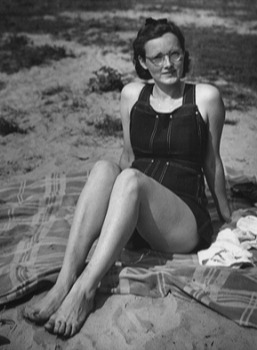|
Scoop's notes in
yellow:
This film left me a
bit confused. There is a telling exchange between the lesbian lovers
when the one says "I am a Jew", and the other says "How
can you love me?" (The latter was a true believer). And that
summed up the whole movie for me. Why did the Jewish girl fall in love
with a woman who seemed to have such a lightweight conception of the
world, of the Jewish people, of love? Frankly, I couldn't really see
what there was to love about the wife. Physical attraction? Sure, she
was pretty enough. But "love" is not just the broth of
physical attraction, but also something more substantial, like good beef soup.
So where's the beef?
- In fact, it was the
wife's foolish attempt to visit her lover at a concentration camp that
undoubtedly ensured the latter's death. The whole trick to survival in
that society was not to be noticed. The wife's ditzy concern for her
own emotional needs raised a red flag which would have caused the
Nazis to think "hey, she's not only a Jew, but a lesbian as well". Not
good for her future.
- Earlier in the film,
the wife was going to divorce her husband, which would have produced
embarrassing public revelations about her "sisters". She just didn't
seem to catch on that being different or grabbing attention wasn't the
right course of action in that world.
- The wife didn't
really seem to understand war any better than she understood politics. Most
of the people in the movie seemed to feel the gravity of the
current war situation. While Berlin was being demolished from the air,
the Allies were landing men on the coastline and the Russians were
turning the tide in the East. Yet the wife seems to think of nothing
but her sexual dalliances. To put it in one ugly, short word, she was
a bimbo.
The other thing
that I found semi-irritating about the film was that the director
didn't do a very smooth job at connecting scenes or providing details
of intermediate activity between events. He leaves the viewer to fill
in a lot. This wasn't an error on his part, but obviously his
deliberate technique, an element of his style, but that doesn't mean I
have to like it.
The movie does have
one very effective scene - the first sexual encounter between Aimee
and Jaguar. The wife had never allowed herself to consider her latent
lesbianism, and a big part of her was still fighting it. So the
actress needed to convey how completely uncomfortable she was in the
situation, and yet how strangely excited. The director let the
actresses have plenty of freedom to establish this scene, and they did
it in a way that convinced me, as good movies can sometimes do, that I
was an unwelcome eavesdropper on an uncomfortable private moment. I
think you have to applaud the honesty of that scene.
In general, however,
I guess I was a little disappointed. I like historical/sociological
dramas, and I heard so much about this highly awarded film that I
thought I'd connect to it emotionally. That connection never really occurred,
maybe because I just didn't "get" their love.
My verdict: a good
movie, but not as good as people said.
|
| The
real Aimee (Lilly Wust)
After the war she got
married one more time - to a man. Short-lived, as you might imagine.
One of her sons
converted to Judaism, and she was recognized of her contributions to
the Jewish community, encompassing actions which occurred both during
and after the war. |

|
DVD info from Amazon.
Widescreen anamorphic,
1.78:1. I wasn't impressed. Most of the film seemed
blurry.
two
documentaries about the production of the movie
several
stills of the real Aimee and Jaguar
info about
what happened to the real characters after the movie ended
|
|
NUDITY REPORT
|
| Schrader shows breasts and
bush, and Johanna Wokalek, Heike Makatsch and Elizabeth Degen
show breasts while being photographed for pin-up shots for the
boys at the front.
|
|
The
Critics Vote
Consensus: three stars. Maltin 3/4, Ebert
3/4.
Rotten Tomatoes
summary. 89% positive reviews.
Was
nominated as best picture in the German Film Awards, and
for a Golden Globe as Best Foreign Movie. Not considered
by the Oscars.
|
The People
Vote ...
- With their
dollars ... it grossed less than a million dollars in
the USA, which is no surprise for a German-language film.
It grossed about $10 million in Germany, a minor success.
(Somewhat more than the budget)
|
| IMDb
guideline: 7.5 usually indicates a level of
excellence, about like three and a half stars
from the critics. 6.0 usually indicates lukewarm
watchability, about like two and a half stars
from the critics. The fives are generally not
worthwhile unless they are really your kind of
material, about like two stars from the critics.
Films under five are generally awful even if you
like that kind of film, equivalent to about one
and a half stars from the critics or less,
depending on just how far below five the rating
is. My own
guideline: A means the movie is so good it
will appeal to you even if you hate the genre. B means the movie is not
good enough to win you over if you hate the
genre, but is good enough to do so if you have an
open mind about this type of film. C means it will only
appeal to genre addicts, and has no crossover
appeal. D means you'll hate it even if you
like the genre. E means that you'll hate it even if
you love the genre. F means that the film is not only
unappealing across-the-board, but technically
inept as well.
Based on this
description, this film is a C+. (Both reviewers)
|
|


